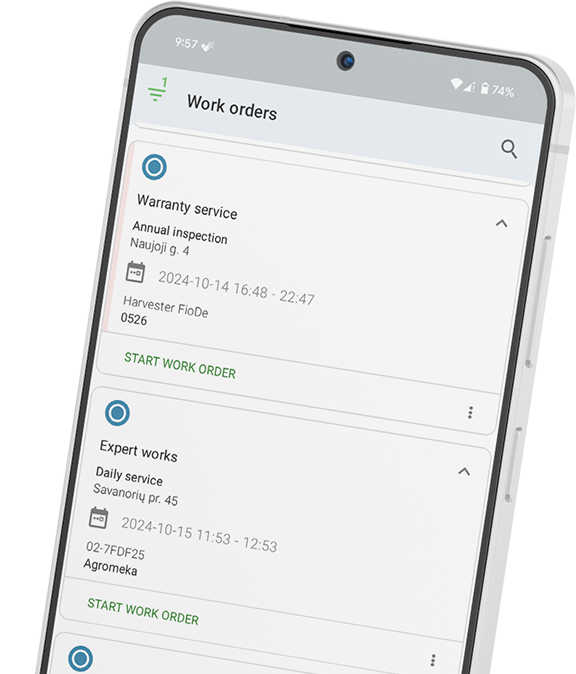Bring simplicity to your field service operations.
Our list of integrations is updated frequently. Explore each integration in its own separate page for more information.
Technicians that operate in the heating, ventilation and air conditioning (HVAC) sector of the field service management industry are required to carry essential HVAC tools in order to do their job. Today, we will be breaking down the essential tools list, but above all, we will be giving you insights into how HVAC software is the glue that makes this entire process work like a Swiss watch.
HVAC trends come and go but one thing remains the same – the need for a solid, comprehensive HVAC software. Here’s what Frontu can offer your business:
A list of the right HVAC tools is nothing but a checklist, put together manually that offers little to no value to your business. A software like Frontu synchronizes each task type to the necessary tools meaning that technicians can simply click on their assigned task and they’ll immediately know what they need to carry with them. Can you imagine the inconvenience of carrying every single item on the HVAC tools list?
The system will then save the template, building the intelligence and data bank necessary to optimize processes going forward. Technicians will carry just the essential HVAC tools onsite and do their job much faster.
Every HVAC technician needs a lightweight hammer in their tool bag. It’s not heavy to carry and it’s necessary no matter the scope or complexity of a project. Put that at the top of your HVAC tool list.
All HVAC technicians know that screws come in different sizes, shapes, and forms which means you need to be prepared for what comes your way. Whether it’s air conditioner units, vents, or thermostats you’ll need to do deal with some screws. One thing to keep an eye on is the make sure that the screwdriver handle is insulated to keep you safe from electrical shock.
The last thing HVAC service techs want is to work in the dark. A good flashlight ensures that your remote workforce can keep working after the sun goes down. Additionally, a flashlight can help you get a closer look in crammed dashboards, poorly lighted storage rooms, and information that is not easily visible with natural light. One tip we could give you is to supply your HVAC technicians with headlamps in order to keep their hands free.
This tool falls under the category of HVAC safety tools, designed to not only help technicians do their job, but keep them safe while doing it on different job sites. The glasses can protect their eyesight from metal and dust debris, and all other elements that can obstruct their vision while at work.
Pipe wrenches are yet another necessary HVAC tool. It’s important to have different sizes in order to handle natural gas and plumbing connections.
Extension cords can prove to be life-saving tools for service technicians. When you need to plug into electricity, there’s no alternative. Get a thick, long cord (50 meters) that can withstand the wear and tear of fieldwork but is also easy to transfer.
A caulking gun is one of the most useful HVAC hand tools on any technician’s list. Use a caulking gun to seal ducts, close a gap or crack between a window frame or HVAC units.
A tape measure is one of the most unassuming and underrated tools in any technician’s list but without it, most HVAC jobs wouldn’t be possible. Most lists feature HVAC specialty tools and advanced tools such as a core removal tool but don’t let them steer your attention away from fundamentals. A tape measure is a durable tool that’s easy to maneuver, measure around corners or curves.
A cordless drill is an absolute must-have on any HVAC tools list. Keep one battery fully charged as a spare while you’re working with the one you have on the drill. Also, keep a wide variety of drill heads to give you options and versatility.
The manifold gauge set is one of the most commonly used and widely considered best HVAC tools on the market. It is used to monitor heating or cooling systems, specifically the pressure of refrigerants as well as to detect leaks when charging air conditioners.
Knowing the temperature in different HVAC business scenarios is critical. A digital thermometer can help you maintain temperature control and regulation.
Gloves might not be the first thing you think about when putting together an HVAC technician tool list but they are particularly useful. HVAC technicians use their hands for most of their projects and a pair of durable gloves can help protect them. It allows technicians to maintain skill and dexterity when surfaces become slippery or for example, apply the right force on a pressure control valve.
The HVAC industry has a high degree of danger in the workplace due to the diversity of tasks and projects HVAC technicians have to deal with. Much like goggles, earplugs fall under the safety tools category and protect technicians’ ears from unplanned loud noises.
Going up and down ladders, being surrounded by heavy machinery, and working outside the office, in adverse weather conditions and terrain means that every HVAC technician needs to protect their feet. A pair of heavy steel-toe work boots is one of the best items on the HVAC tools list.

Our list of integrations is updated frequently. Explore each integration in its own separate page for more information.

Link copied!